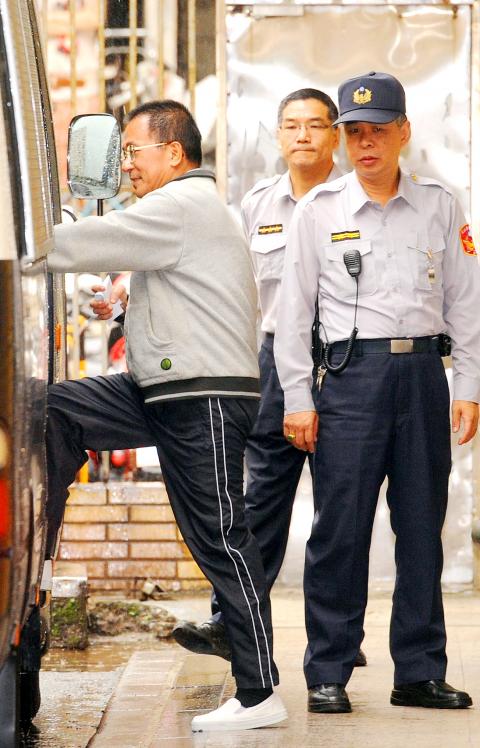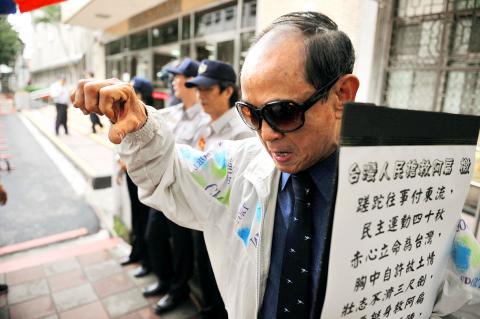|
Chen found guilty of
receiving bribes
JUSTICE IS BLIND: A DPP spokesman said that in a
democratic country, court rulings had to be consistent and understandable in
their logic for them to be trusted
By Loa Iok-sin / Staff Reporter, with CNA

Former president Chen Shui-bian
climbs into a prison van outside the Taiwan High Court in Taipei yesterday after
being sentenced to 18 years in prison for his part in receiving bribes related
to a series of bank mergers.
Photo: Lo Pei-der, Taipei Times

A supporter of former president
Chen Shui-bian outside the Taiwan High Court expresses his dissatisfaction with
a ruling yesterday in which Chen was found guilty of bribery over a series of
bank mergers.
Photo: CNA
Former president Chen Shui-bian (陳水扁) was
yesterday sentenced to 18 years in prison by the Taiwan High Court for taking
bribes in relation to a series of bank mergers during his eight years in power,
fined NT$180 million (US$5.95 million) and stripped of his civil rights for nine
years.
His wife, Wu Shu-jen (吳淑珍), was sentenced to 11 years and fined NT$102 million
in the same case and stripped of her civil rights for eight years.
The ruling overturned a ruling in November last year by the Taipei District
Court, which cleared the former president and his wife of all charges over
merger approvals during the second phase of his administration’s financial
reforms, based on a lack of evidence that they received bribes from financial
holding companies to ensure the mergers went in their favor. Chen and Wu’s son,
Chen Chih-chung (陳致中), and daughter-in-law, Huang Jui-ching (黃睿靚), were also
acquitted in that ruling.
Special Investigation Panel (SIP) prosecutors charged the defendants in December
2009, alleging that bankers had bribed the former president into pressuring the
Ministry of Finance to approve the mergers during financial reforms promoted by
the Chen administration to encourage greater consolidation in the banking
sector.
In the November ruling Judge Chou Chan-chun (周占春) said that according to the
Anti-Corruption Act (貪汙治罪條例), a public official who takes bribes in exchange for
favorable decisions or policies violates the law, but since the Constitution
does not give the president specific powers with relation to bank mergers, Chen
Shui-bian could not have been bribed by the banks to influence the mergers.
The SIP appealed that ruling to the Taiwan High Court.
In addition to heavy sentences for Chen Shui-bian and his wife, Chen Chih-chung
was sentenced to one year in prison and Huang to six months. The two were also
fined NT$4 million and NT$2 million respectively.
In a written verdict, Taiwan High Court Presiding Judge Chang Chuan-li (張傳栗)
said the powers of the president had expanded following seven constitutional
amendments, concluding that “the president certainly could influence”
decisionmaking on the merger of financial institutions.
Speaking to the media after the ruling, Chen Shui-bian’s lawyer Chen Wen-lung
(鄭文龍) said his client was disappointed and would appeal the ruling.
Chen Shui-bian, Wu Shu-jen and Chen Chih-chung can all -appeal the ruling.
An official from Chen Shui--bian’s office, Chiang Chih-ming (江志銘) added that it
was hard not to conclude that the sentence was politically motivated.
Democratic Progressive Party (DPP) spokesperson Chuang Ruei-hsiung (莊瑞雄) said
court rulings in a democratic country should demonstrate consistency in their
logic and that the judicial system had to be seen to be consistent and
understandable in its rulings to be trusted.
The “erratic changes” in sentencing from the first to the second trials do not
reflect such consistency, Chuang said, adding that it was little wonder people
had lost faith in the judicial system.
The timing and divergent rulings are suspicious, Chuang said, adding that it was
hard not to think that political motives were at play, given the presidential
and legislative elections in January.
“The DPP adheres to the spirit of democracy and rule of law, and we hope the
judiciary will focus on the need for a just trial so that the credibility of the
judicial system can be restored,” Chuang said.
With translation by Jake Chung
|
![]()
![]()
![]()